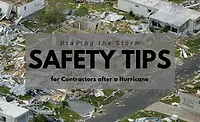RIA Provides Health and Safety Tips for "After the Flood"
Columbia, Maryland – As residents in the Midwest begin their clean-up efforts following days of severe flooding, the Restoration Industry Association (RIA, formerly ASCR) offers these safety tips for residents returning to their homes and businesses:
“RIA members are in a unique position to provide expertise on restoration under these circumstances,” says RIA President Rusty Amarante, CR, “but our primary concern is the safety of the individuals returning to their homes and businesses. There are many unseen hazards and we want to protect them from further injury.”
- Wear sturdy rubber gloves and boots.
- Watch for sharp objects and contaminated materials in deep waters.
- Drink plenty of fluids to stay hydrated. Rest frequently to avoid overheating and exertion.
- Wash hands and face frequently using an anti-microbial soap if available. Keep fingers away from eyes, nose and mouth.
- Have a first-aid kit handy. Treat cuts and abrasions immediately with an antibiotic ointment.
- Confirm that the water is clean and safe. If there is a boil-water advisory, boil water for washing for at least one minute or add 1 teaspoon of household bleach per gallon of water and let stand for 30 minutes.
- Children, pregnant women and people with health problems should avoid the flooded area until cleanup is complete.
- Enter the premises only during daylight hours. Do not use candles or gas lanterns.
- Leave the house immediately if there is an odor of gas or any suggestion of instability in the structure. Notify authorities and wait for an authorized inspection before re-entering.
- If the power is off, turn the main electrical breaker off and tape it down to prevent it from accidentally turning on when the power is restored.
- If you have oil or propane, turn off the fuel valve at the tank. Turn off natural gas at the meter.
- Do not attempt to vacuum water with anything other than a vacuum specifically designed for wet pickup.
- Treat all water impacted surfaces and furnishings as if contaminated and toxic.
- Do call an experienced restoration firm for professional emergency and clean up services.
“RIA members are in a unique position to provide expertise on restoration under these circumstances,” says RIA President Rusty Amarante, CR, “but our primary concern is the safety of the individuals returning to their homes and businesses. There are many unseen hazards and we want to protect them from further injury.”
Looking for a reprint of this article?
From high-res PDFs to custom plaques, order your copy today!





